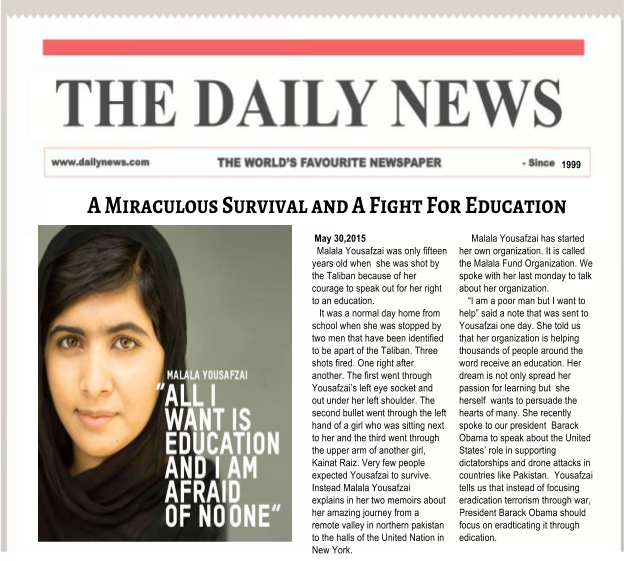



“Malala Fund breaks down the barriers preventing more than 130 million girls around the world from going to school.”
Huma's Story

"With no middle school for girls in her village in Pakistan to attend, Huma dropped out of school at age 12.
A Malala Fund grant supported the construction of a new school in Huma’s village and allowed her — and 1000 more girls — to continue their studies."
Malala doesn't want girls to go through the same thing she had to go though. She is finding ways to make sure all girls, not just in Pakistan, go to school. Malala is making a change in the education system and is altering the was people see strength and confidence in women. Without her, thousands of girls wouldn't be in school.
Women shouldn't have to rely on men to bring them money, food, and safety every day. They need to be able to show that they can be individuals too and can complete the same tasks as men. I live in America and don't have to worry about things like having an education and I am very grateful. I could not imagine my life if it was ruled by men. Diversity is very important in a public environment and it is incredibly hard to fight for women's rights once you've hit "rock bottom."

A Picture from Malala's book "I Am Malala: The Girl Who Stood up for Education and was Shot by the Taliban"

Malala Yousafzai visits a school in Karachi, Pakistan, October 7th, 2013
"They thought that the bullets would silence us. But they failed”
"Malala Yousafzai Gets Her Own Astroied"

"We desperately need the brainpower of all smart people to solve some of humanity's most difficult problems, and we can't afford to reject half the populations."
A Young Hero
October 11th, 2012
“The Norwegian Nobel Committee has decided that the Nobel Peace Prize for 2014 is to be awarded to Kailash Satyarthi and Malala Yousafzai for their struggle against the suppression of children and young people and for the right of all children to education.”
“Despite her youth, Malala Yousafzai has already fought for several years for the right of girls to education, and has shown by example that children and young people, too, can contribute to improving their own situations. This she has done under the most dangerous circumstances. Through her heroic struggle she has become a leading spokesperson for girls’ rights to education.”
Malala became the first Pashtun (Pashto-speaking people), first Pakistani, and the youngest person to recieve this award.
Lessons From Malala
“Do not let your age stop you from changing the world, because I started speaking out when I was 11."
“I was not thinking for a second that, just because I'm young, I cannot change the world.”
“Believe in yourself, believe in your voice, and believe in the power that you have.
Malala believes that no matter your age, culture, religion or background, you can be the change you want to see in the world.

January 12th, 2019
Isaac Chotiner: You went through what no one should have to go through. Now you get to meet Presidents and Prime Ministers. You hang out with Tim Cook and Bill Gates. When you’ve reached this level of global fame and also are able to interact with people who are in power, how does that affect being an activist? Do you think that getting too close to power is something that activists should be concerned about?
Malala Yousafzai: “I’m grateful for the opportunities that I have. I never want to meet a Prime Minister of a country or a global figure because I just want to hang out with them or have a selfie. My condition for meeting always is that I am going to be talking about how they are treating people in their country or how they are not investing in girls’ education or how they’re treating refugees. When I was meeting the Prime Minister and the President in Nigeria, or meeting the Prime Ministers and Presidents in the European countries, or anywhere else, my goal is always to speak the truth. I always think about representing the girls who do not have the voice, who do not have the opportunity to go to the stage and speak up for themselves.”
